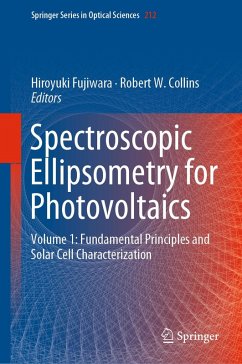This book provides a basic understanding of spectroscopic ellipsometry, with a focus on characterization methods of a broad range of solar cell materials/devices, from traditional solar cell materials (Si, CuInGaSe2, and CdTe) to more advanced emerging materials (Cu2ZnSnSe4, organics, and hybrid perovskites), fulfilling a critical need in the photovoltaic community.
The book describes optical constants of a variety of semiconductor light absorbers, transparent conductive oxides and metals that are vital for the interpretation of solar cell characteristics and device simulations. It is divided into four parts: fundamental principles of ellipsometry; characterization of solar cell materials/structures; ellipsometry applications including optical simulations of solar cell devices and online monitoring of film processing; and the optical constants of solar cell component layers.
The book describes optical constants of a variety of semiconductor light absorbers, transparent conductive oxides and metals that are vital for the interpretation of solar cell characteristics and device simulations. It is divided into four parts: fundamental principles of ellipsometry; characterization of solar cell materials/structures; ellipsometry applications including optical simulations of solar cell devices and online monitoring of film processing; and the optical constants of solar cell component layers.
Dieser Download kann aus rechtlichen Gründen nur mit Rechnungsadresse in A, B, BG, CY, CZ, D, DK, EW, E, FIN, F, GR, HR, H, IRL, I, LT, L, LR, M, NL, PL, P, R, S, SLO, SK ausgeliefert werden.

